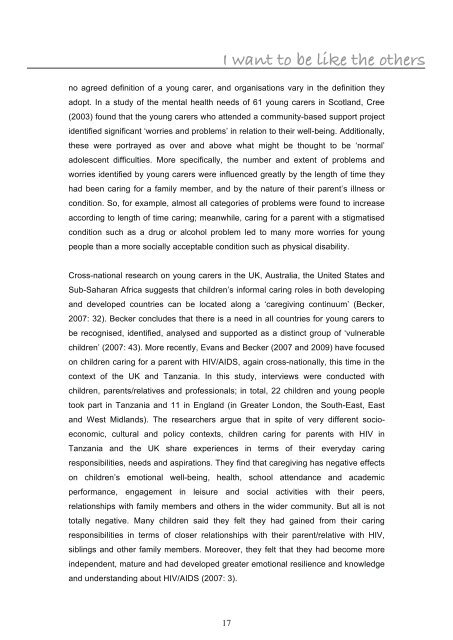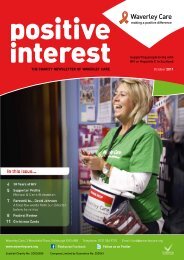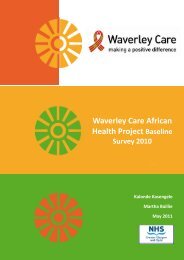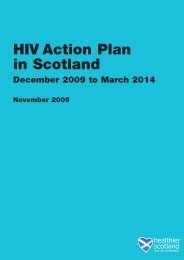I want to be like the others - Waverley Care
I want to be like the others - Waverley Care
I want to be like the others - Waverley Care
- No tags were found...
Create successful ePaper yourself
Turn your PDF publications into a flip-book with our unique Google optimized e-Paper software.
1717I <strong>want</strong> <strong>to</strong> <strong>be</strong> <strong>like</strong> <strong>the</strong> o<strong>the</strong>rsno agreed definition of a young carer, and organisations vary in <strong>the</strong> definition <strong>the</strong>yadopt. In a study of <strong>the</strong> mental health needs of 61 young carers in Scotland, Cree(2003) found that <strong>the</strong> young carers who attended a community-based support projectidentified significant ‘worries and problems’ in relation <strong>to</strong> <strong>the</strong>ir well-<strong>be</strong>ing. Additionally,<strong>the</strong>se were portrayed as over and above what might <strong>be</strong> thought <strong>to</strong> <strong>be</strong> ‘normal’adolescent difficulties. More specifically, <strong>the</strong> num<strong>be</strong>r and extent of problems andworries identified by young carers were influenced greatly by <strong>the</strong> length of time <strong>the</strong>yhad <strong>be</strong>en caring for a family mem<strong>be</strong>r, and by <strong>the</strong> nature of <strong>the</strong>ir parent’s illness orcondition. So, for example, almost all categories of problems were found <strong>to</strong> increaseaccording <strong>to</strong> length of time caring; meanwhile, caring for a parent with a stigmatisedcondition such as a drug or alcohol problem led <strong>to</strong> many more worries for youngpeople than a more socially acceptable condition such as physical disability.Cross-national research on young carers in <strong>the</strong> UK, Australia, <strong>the</strong> United States andSub-Saharan Africa suggests that children’s informal caring roles in both developingand developed countries can <strong>be</strong> located along a ‘caregiving continuum’ (Becker,2007: 32). Becker concludes that <strong>the</strong>re is a need in all countries for young carers <strong>to</strong><strong>be</strong> recognised, identified, analysed and supported as a distinct group of ‘vulnerablechildren’ (2007: 43). More recently, Evans and Becker (2007 and 2009) have focusedon children caring for a parent with HIV/AIDS, again cross-nationally, this time in <strong>the</strong>context of <strong>the</strong> UK and Tanzania. In this study, interviews were conducted withchildren, parents/relatives and professionals; in <strong>to</strong>tal, 22 children and young people<strong>to</strong>ok part in Tanzania and 11 in England (in Greater London, <strong>the</strong> South-East, Eastand West Midlands). The researchers argue that in spite of very different socioeconomic,cultural and policy contexts, children caring for parents with HIV inTanzania and <strong>the</strong> UK share experiences in terms of <strong>the</strong>ir everyday caringresponsibilities, needs and aspirations. They find that caregiving has negative effectson children’s emotional well-<strong>be</strong>ing, health, school attendance and academicperformance, engagement in leisure and social activities with <strong>the</strong>ir peers,relationships with family mem<strong>be</strong>rs and o<strong>the</strong>rs in <strong>the</strong> wider community. But all is not<strong>to</strong>tally negative. Many children said <strong>the</strong>y felt <strong>the</strong>y had gained from <strong>the</strong>ir caringresponsibilities in terms of closer relationships with <strong>the</strong>ir parent/relative with HIV,siblings and o<strong>the</strong>r family mem<strong>be</strong>rs. Moreover, <strong>the</strong>y felt that <strong>the</strong>y had <strong>be</strong>come moreindependent, mature and had developed greater emotional resilience and knowledgeand understanding about HIV/AIDS (2007: 3).











